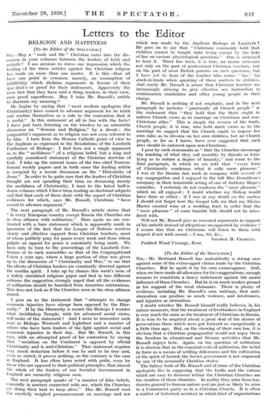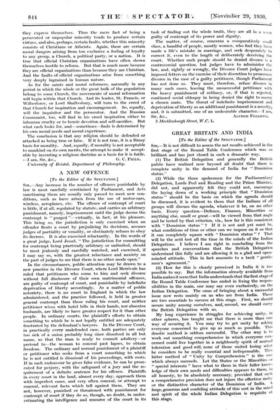[To the Editor of the SPECTATOR.] Sm,—Mr. Bertrand Russell has
undoubtedly a strong case against some of the extravagant claims made by the Christian Churches. But he spoils it by his own extravagance. Still, when we have made all allowance for his exaggerations, enough remains to constitute a heavy indictment against the moral influence of these Churches. But he is on much weaker ground in his support of the rival claimants. There is plenty of evidence, including Mr. Russell's own writings, that anti- clericalism can produce as much violence, and intolerance, and injustice as clericalism.
• I doubt whether Mr. Russell himself really believes, in his calmer moments, that the treatment of freethinkers in England is very much the same as the treatment of Christians in Russia. It is wise to be sceptical about a great deal of the stories of persecutions there which were put forward so energetically a a little time ago. But, on the showing of their own law, it is obvious that a Christian propagandist would not enjoy there the freedom in educational and literary activities that Mr. Russell enjoys here. Again, on the question of militarism it is obvious that in the essential evils of militarism, the belief in force as a means of settling differences and the cultivation of the spirit of hatred, the Soviet government is not surpassed by any of the nominally Christian states.
The fallacy both of Mr. Russell and of some of the Christian apologists lies in supposing that the faults and the virtues which are easy to discover within the Christian Churches are the creation of those churches. In reality they arise from ten. dencies general to human nature and are just as likely to arise in a Communist party as in a Christian Church, It is often a matter of historical accident in which kind of organizations they express themselves. Thus the mere fact of being a persecuted or unpopular minority tends to produce tiertain virtues, and also, perhaps, certain faults, whether this minority consists of Christians or Atheists. Again, there are certain moral dangers arising from too exclusive a feeling of loyalty to any group, a Church, a political party, or a nation. It is true that official Christian organizations have often shown themselves hostile to reform. But that is much more because they are official organizations than because they are Christian. And the faults of official organizations arise from something very deeply ingrained in human nature.
As for the saints and moral reformers, naturally in any period in which the whole or the great bulk of the population belong to some Church, the movements of moral reformation will begin within that Church. And its leader, St. Francis, or Wilberforce, or Lord Shaftesbury, will turn to the creed of that Church for inspiration and encouragement. So, equally, will the inquisitor and the persecutor. And the Russian Communist, too, will find in his creed inspiration either to inhuman cruelty or to heroic devotion and self-sacrifice. But what each looks for, and—sometimes--finds is determined by his own moral needs and moral experience.
The conclusion is that any religion should be defended or attacked as being true or false. If it is not true, it is a flimsy basis for morality. And, equally, if morality is not acceptable to mankind on its own merits, the attempt to make it accept- able by inventing a religious doctrine as a basis for it is futile.











































 Previous page
Previous page